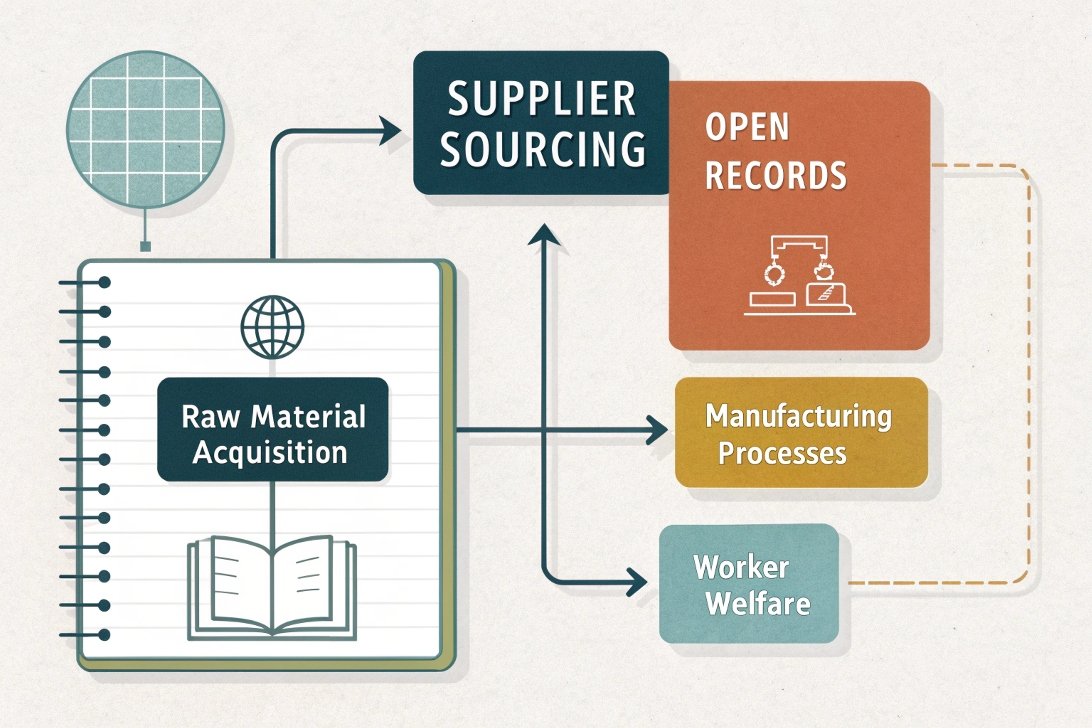
Ensuring ethical sourcing when acquiring custom metal parts is more than just a best practice—it’s a fundamental part of running a responsible and sustainable business. I’ve learned over the years that ethical sourcing1 directly impacts not only your reputation but also the strength of your long-term relationships with suppliers. So, how can you be sure your parts are being sourced ethically?
Ensuring the ethical sourcing of custom parts requires diligence, transparency, and clear criteria for selecting suppliers who adhere to environmental, labor, and social standards. By making ethical sourcing a priority, you can build a strong, responsible supply chain that benefits both your business and the communities you work with.
Let’s dive into how you can ensure ethical sourcing when acquiring custom metal parts and why it’s so crucial for your business’s success.
What Are the Key Principles of Ethical Sourcing for Custom Parts?

Ethical sourcing focuses on ensuring that suppliers meet high standards regarding labor practices, environmental sustainability2, and social responsibility. For custom metal parts, it’s important to make sure that your supply chain follows these principles to avoid reputational risks and support a positive global impact.
Key Principles of Ethical Sourcing
| Principle | What It Means for Sourcing Custom Parts |
|---|---|
| Fair Labor Practices | Ensuring that workers are paid fairly, work in safe conditions, and have access to basic rights. |
| Environmental Sustainability | Using eco-friendly practices, such as reducing waste, recycling, and minimizing the carbon footprint during production. |
| Supply Chain Transparency | Making sure that the entire supply chain is transparent and traceable, ensuring that no unethical practices occur at any stage. |
| Respect for Human Rights | Ensuring that suppliers operate without violating human rights, such as forced labor or child labor. |
| Local Community Support | Ensuring suppliers support their local communities by offering fair wages and contributing to local development. |
| Compliance with Laws and Regulations | Adhering to local and international laws on labor, environmental standards, and safety protocols. |
My Experience with Ethical Sourcing
A few years ago, I had to make a tough decision when sourcing custom metal parts from a supplier that had some questionable labor practices. The long-term impact of this decision made me realize the importance of ethical sourcing, not only to avoid legal or reputational risks but also to ensure the well-being of those involved in the production process. Since then, I’ve made it a point to work with suppliers who share my commitment to ethics and sustainability.
How Can You Verify the Ethical Practices of Your Custom Parts Suppliers?

Verifying the ethical practices of your suppliers requires a proactive approach. It’s essential to conduct thorough checks, audits, and evaluations to ensure that they align with your company’s values and ethical standards. Here are some strategies to verify a supplier’s commitment to ethical sourcing.
Steps to Verify Ethical Practices
| Step | How It Helps |
|---|---|
| Request Certifications | Ask for certifications like ISO 14001 (environmental), ISO 9001 (quality), or SA8000 (social accountability). These certifications indicate that suppliers meet specific ethical standards. |
| Conduct Supplier Audits | Perform on-site audits or hire third-party auditors to assess the supplier’s practices, ensuring they comply with labor, environmental, and ethical guidelines. |
| Review Worker Conditions | Evaluate the working conditions of employees, including wages, hours, safety measures, and benefits, to ensure they meet ethical standards. |
| Evaluate Transparency | Request full transparency from your suppliers regarding sourcing, manufacturing processes, and labor practices. Transparency is key to ensuring that no unethical practices are being employed. |
| Use Third-Party Verifiers | Utilize organizations that specialize in verifying supply chain practices, such as Fair Trade, Global Reporting Initiative (GRI), or Ethical Trading Initiative (ETI). |
| Monitor for Red Flags | Watch out for red flags like lack of proper certifications, sudden price hikes, or suppliers refusing transparency. These could signal potential ethical concerns. |
My Approach to Verifying Ethical Practices
I’ve always found that conducting a detailed supplier audit is one of the most effective ways to verify a supplier’s ethical practices. For example, when I sourced custom metal parts for a previous project, I worked closely with a third-party audit company that provided an in-depth report on the supplier’s labor practices, safety standards, and environmental impact. This audit gave me peace of mind and ensured that we maintained our commitment to ethical sourcing.
Why Is Ethical Sourcing Important for Long-Term Supplier Relationships?

Ethical sourcing is not just about doing the right thing—it’s also a strategy that can foster stronger, more durable supplier relationships. When both you and your supplier share similar values, it creates a partnership built on trust, transparency, and mutual respect.
The Importance of Ethical Sourcing for Long-Term Relationships
| Reason | How It Benefits Your Relationship with Suppliers |
|---|---|
| Builds Trust | Suppliers that adhere to ethical practices are more likely to be trustworthy, creating a solid foundation for a long-term relationship. |
| Enhances Collaboration | Working with ethical suppliers opens the door to more collaboration, as both parties share common values and goals. |
| Reduces Risk | Ethical sourcing reduces the risk of reputational damage, legal issues, and production disruptions caused by unethical practices. |
| Improves Communication | Suppliers committed to ethical sourcing are more likely to maintain open, honest communication, which is vital for smooth operations. |
| Attracts Loyal Partners | Ethical sourcing can attract high-quality, reputable suppliers who prioritize long-term relationships over short-term profits. |
My Experience with Ethical Supplier Relationships
Over the years, I’ve seen the importance of maintaining strong ethical standards with suppliers. In one instance, we worked with a supplier who consistently demonstrated a commitment to social responsibility, including paying fair wages and maintaining environmental standards. This not only improved the quality of our parts but also led to a long-term partnership that benefited both our business and theirs. Our mutual commitment to ethical practices strengthened our relationship and allowed for smoother collaboration and better outcomes.
Conclusion
Ensuring ethical sourcing of custom metal parts is essential for both your company’s reputation and the sustainability of your supply chain. By adhering to key principles of ethical sourcing, verifying supplier practices, and fostering strong, ethical supplier relationships, you can create a responsible and successful sourcing strategy. In my experience, ethical sourcing doesn’t just help you avoid risks—it’s also a powerful way to build trust and long-term partnerships with suppliers.

